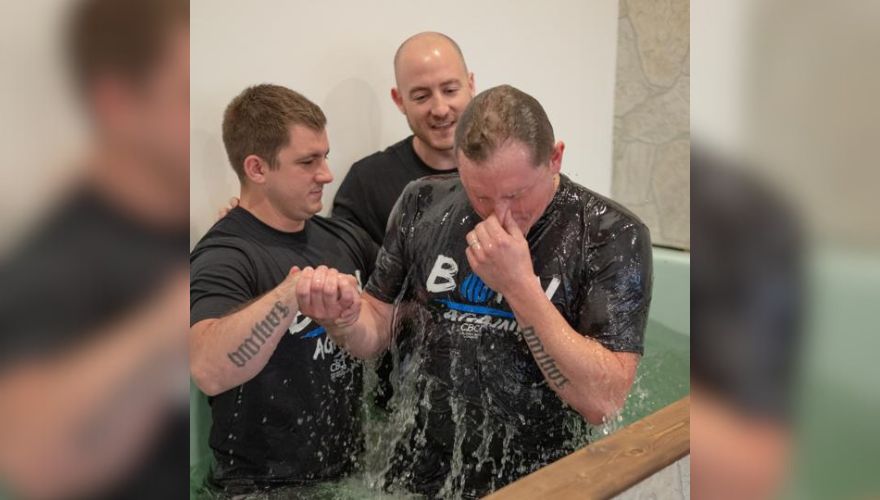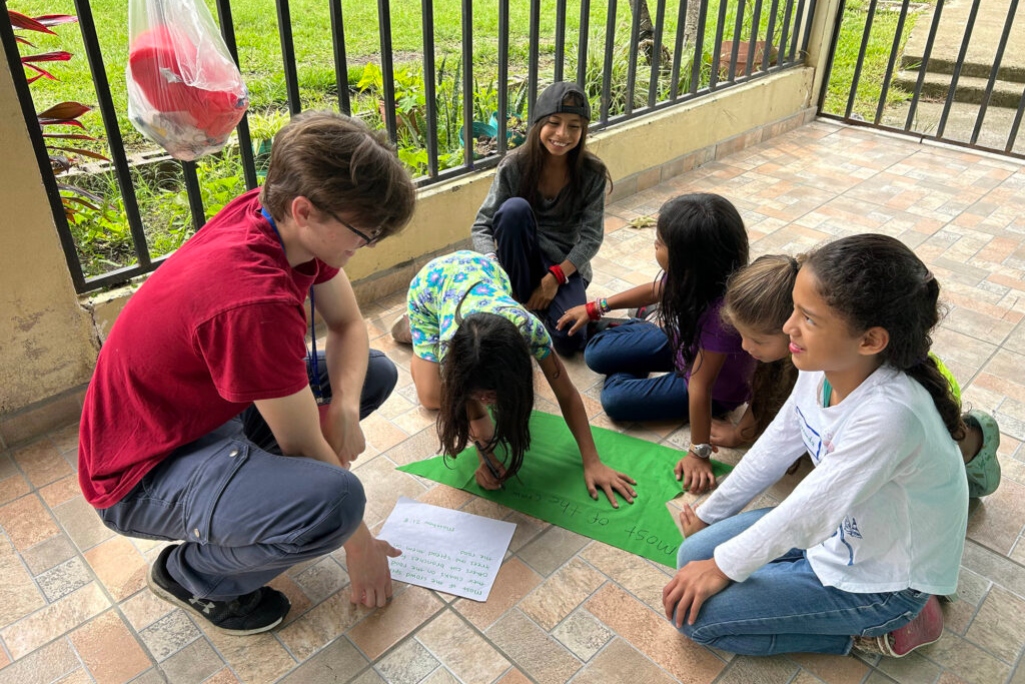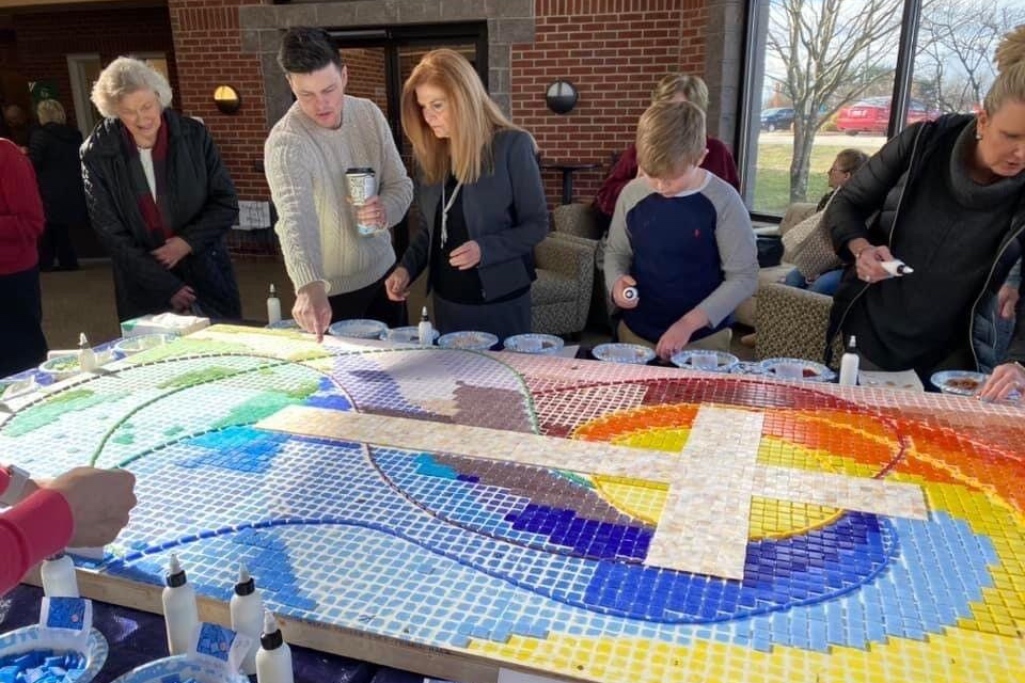
A baptism is celebrated at Calvary Baptist Church in Grand Rivers, Ky.
PADUCAH, Ky. (BP) — Nick Forsythe has both feet planted in vocational ministry; he just works two jobs. A bivocational pastor shepherding the same congregation since he was 18 years old, Forsythe also serves as Paducah center director for Hope Unlimited Family Care Center in Paducah.
“Everybody always tells me this: I don’t know how you do this. And I say, ‘I don’t know either.’ I mean, it’s just the grace of the Lord,” Forsythe said.
Born and raised in church, Forsythe didn’t know Jesus until he was 12 years old. Not long after his conversion, his youth leader observed the way Forsythe would take notes and redo his pastor’s sermons and encouraged him to talk with that pastor. Both saw in Forsythe the capacity for a call to preach.
“I was like, ‘No, I mean, get out of town. I’m 14. This ain’t happening.’ And sure enough, it wasn’t too long that the call became very, very strong.”
Forsythe’s youth leader allowed him to preach to the youth as a trial.
“I was so nervous at 14 that — my church loved to tell the story, because it is the truth — I preached to the youth on a Friday night…I could not preach with the lights on, so I had them turn the lights off.”
Forsythe delivered his first sermon in the dark, and several more followed.
“The Lord kind of built up more confidence and I fully surrendered in May when I was 14 years old,” he added.
When it was time to leave home for college, Forsythe thought about stepping away from preaching. But the Lord had other plans, planting him early at Calvary Baptist Church in Grand Rivers, Kentucky.
“That was my first pastorate,” he said. “I started pastoring there straight out of high school. I graduated in May and became the interim pastor there at Calvary in November of 2009. And I’ve been there ever since.”
“One big ministry”
It’s been nearly six years since Forsythe joined the Hope Unlimited team as an educator before becoming the family resource director. He worked with couples and oversaw the men’s ministry, and he’s continuing that work as the new Paducah Center director.
“The church really loves that I work here because they see it as ministry,” Forsythe noted. “They see it all as one big ministry. Our pastor is serving the church and serving the community and sharing the gospel with lost people, and he can do that here at our office or he can do it there at their office — but it’s all ministry to them.”
Forsythe is on-site at Hope Unlimited Monday through Thursday, and when he’s not at the pregnancy center, he is pastoring Calvary Baptist Church. That’s required grace and flexibility from his church and his nonprofit employer.
He noted that Calvary is kind, understanding that he’s the best pastor he can be when he’s a good husband and father. “That’s been huge for us…they really understand my first call is to be a good husband to my wife and to be a good father to my children. And then my third call is to be a good pastor to them. And, of course, Hope is the fourth call.”
While he can’t always be present, Forsythe utilizes technology to check on his congregation throughout the week — like sending a recorded prayer through a voice memo by text and calling members.
And the team of elders who lead with him at Calvary, as well as the team at Hope Unlimited, enable him to balance both jobs.
Forsythe said he’s learned a lot in the past 15 years of ministry.
“I tell everybody, when I started — and I was 18 — I was young, I was dumb and I was arrogant,” Forsythe said. “Through God’s grace, I mean, He’s really grown me a lot.”
Much of that growth came through marriage and having children.
“I instantly became a better pastor when I got married,” Forsythe said, adding that his wife, Emily, is the “secret sauce” of how he balances multiple responsibilities in bivocational ministry — all while earning a Masters of Divinity degree from The Southern Baptist Theological Seminary (SBTS).
“(I) became an even better pastor when I had kids. I thought I understood how the Lord loved me until I had babies,” he said. “All of that has really shaped me and formed me in ways where it’s made me a better pastor where I can love people well and love them where they’re at and care more about where they’re going than where they’ve been,” he said. “That’s what I really desire to do in ministry, is to love people where they’re at, but also understand that Jesus saves us, Jesus changes us…Everybody (who) comes in contact with Christ walks away changed.”
No part-time pastors
Forsythe wants other bivocational pastors to be encouraged by the fact that the Lord sees them and their work.
“The Lord doesn’t see part-time pastors. The Lord doesn’t see bivocational ministers. He sees all of us as ministers. He sees all of us as pastors who are loving the flock well,” Forsythe said, adding that pastors serving bivocationally — in both the church and secular fields — are the backbone of the Southern Baptist Convention (SBC).
Forsythe believes that it’s a blessing and encouragement to work in the community, and he challenged full-time ministers to get out of the office and be intentional to meet lost people.
“What I love about the jobs I’ve had in the secular world, and especially here at Hope…is I get to come in contact with lost people every single day. And so every single day I have the opportunity to share the gospel. Every single day I meet people who will never, ever come to my church, who will never darken the door of any church in this area. But they come to Hope because we have a free, confidential service and we fill a need. And they come here knowing that we are going to love them well and point them in the right direction,” Forsythe said.
Studying at a coffee shop, volunteering at a local school or serving at a faith-based nonprofit like Hope Unlimited are all ways pastors can get out into the community.
“To love that community well, to preach the word that that community needs to hear — I fully believe God can do that sovereignly, He can just give it to you — but also part of the pastor’s responsibility is to have his hand on the pulse of the community, be out there knowing what the community is going through, feeling what they feel, ministering to them because he understands what ministry they need,” he added. “And the only way that happens is if we are out about in the community.”
(EDITOR’S NOTE — This story first appeared at Kentucky Today.)


